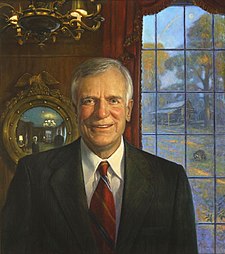Lawton Chiles
| Lawton Mainor Chiles, Jr. | |
 | |
41st Governor of Florida | |
|---|---|
| In office January 8, 1991 – December 12, 1998 | |
| Lieutenant | Buddy MacKay |
| Preceded by | Bob Martinez |
| Succeeded by | Buddy MacKay |
| In office January 3, 1971 – January 3, 1989 | |
| Preceded by | Spessard Holland |
| Succeeded by | Connie Mack III |
Chairman of the Senate Committee on the Budget | |
| In office January 3, 1987 – January 3, 1989 | |
| Preceded by | Pete Domenici |
| Succeeded by | Jim Sasser |
Chairman of the Senate Special Committee on Aging | |
| In office January 3, 1979 – January 3, 1981 | |
| Preceded by | Frank Church |
| Succeeded by | H. John Heinz III |
| Born | April 3, 1930 Polk County, Florida |
| Died | December 12, 1998 (aged 68) Tallahassee, Florida |
| Political party | Democratic |
| Spouse(s) | Rhea Chiles |
| Alma mater | University of Florida |
| Religion | Presbyterianism |
| Military service | |
| Service/branch | United States Army |
| Years of service | 1953-1954 |
| Battles/wars | Korean War |
Contents[show] |
[edit] Early life
[edit] Politics
[edit] The 1,003-mile walk
[edit] The Senate
[edit] Governor of Florida
[edit] Legacy
[edit] Legislative and executive programs
[edit] Judicial appointments
- In 2006, the Court struck down a law passed by the Florida legislature that had created the United States' first statewide education voucher program. The majority in this case consisted of Wells, Anstead, Pariente, Lewis, and Quince. Bush appointees Raoul G. Cantero and Kenneth B. Bell dissented.
- In 2004, the court struck down another piece of legislation from the Florida legislature designed to reverse a lower court decision in the Terri Schiavo case. This decision was unanimous and included Bush appointees Cantero and Bell. By this time, Harding had retired.
- In the 2000 presidential election controversy, the Florida Supreme Court ordered a statewide recount in the disputed election pitting George W. Bush against Al Gore. The United States Supreme Court Bob Graham. Shaw retired in early 2003 and was replaced by Be later reversed that ruling. The Florida Supreme Court majority in this case consisted of Anstead, Pariente, Lewis, and Quince. Dissenting Justices were Wells, Harding, and Leander J. Shaw, Jr., an appointee of Gov.

